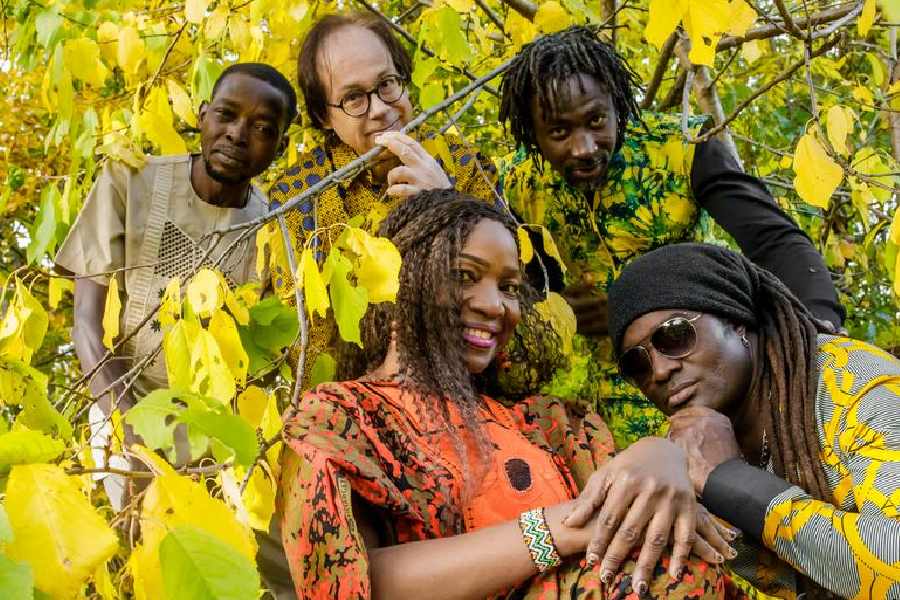Lukas Ligeti has had his hands full. In memory of his father, the acclaimed composer György Ligeti, he has been busy with several concurrent commissioned works.
"Most of my activities now are under the star of my father's 100th birthday on May 28," the composer and percussionist told DW. Ligeti and his African band Burkina Electric are in the line-up at the jazz festival in Moers in northwestern Germany, which has a special focus on György Ligeti this year.
György Ligeti, Karlheinz Stockhausen, Mauricio Kagel and Pierre Boulez, — they were the best-known representatives of New Music in the second half of the 20th century.
A Hungarian Jew, Ligeti grew up in what was then Romanian Transylvania. Under Nazi rule, he lost his father and brother, who were murdered in concentration camps.
How Stanley Kubrick stole Ligeti's music
In 1956, in the wake of the failed Hungarian People's Uprising against the Soviet occupation forces, Ligeti fled to Vienna. He lived in Berlin and the United States, and later in life worked as a professor of composition at Hamburg's University for Music and Theater. Ligeti died in Vienna in June 2006 at the age of 83.
His 1961 orchestral piecen "Atmospheresn" was György Ligeti's breakthrough in the West. The choral work "Lux Aeterna," composed in 1966, also caused a sensation.
In 1968, US film director Stanley Kubrick liked both pieces so much that he decided without further ado to use them for his famous science fiction epic "2001: A Space Odyssey" — but without permission.
"One day, my father went to see this film that everyone said was so good," Lukas Ligeti says. "When he heard its music, of course he was speechless and shocked."
After the screening, an elderly lady came up to Ligeti and said the only thing she liked about the film was the music. György Ligeti thanked her — and replied that the music was his. Dismissive, the lady just said, 'sure young man, of course'".
The composer sued Kubrick but settled out of court. Kubrick later used other works by György Ligeti in his films "The Shining" and "Eyes Wide Shut," but with permission and payment.
In honor of the composer, the Südwestrundfunk vocal ensemble will perform Ligeti's choral work "Lux Aeterna," on which the soundtrack for the Space Odyssey film is based, at the jazz festival in Moers.
Deutsche Welle is set to broadcast the concert as a livestream on its DW Classical Music Youtube channel.
Improvising vocalists and avant-garde experiments
The second part of the concert features the "Trondheim Voices" from Norway. The eight singers got together 20 years ago as a collective improvisation ensemble specializing in live remix concerts.
"We do an improvisation inspired by Ligeti's 'Lux Aeterna,'" says the group's artistic director, Sissel Vera Pettersen. However, the work only serves as the basis for improvisation, she adds.
Trondheim Voices use small specially designed electronic devices called "Maccatrols." They each wear the device on their body and can use it individually to create loops and various vocal effects during the concert.
"The audience will hear many sounds that don't sound like a natural voice, but all the music comes live from the source of the voices," Pettersen says.
The jazz festival in Moers does not see itself as a classical jazz festival. Since its founding in 1972, it has always been open to avant-garde experiments. That's what connects Moers to Ligeti's music, says festival director Tom Isfort.
"The soundtrack of '2001: A Space Odyssey,' that is what grabbed people from the free jazz scene at the time who also studied with professors of new music," he told DW.
György Ligeti developed what he called micropolyphony: many individual independent voices merge to form a wide variety of timbres, the so-called clusters, in which the notes are very close to one another, as evidenced in "Lux Aeterna" from Kubrick's film.
Shared love for Africa
In the 1960s, György Ligeti also experimented with electronically generated sounds. However, he composed few electronic pieces, unlike his son Lukas, who often uses electronic sounds.
He describes his own music as "experimental intercultural music" in which improvisation often plays a major role. Lukas Ligeti uses elements of African musical traditions as well as those from the European concert tradition and jazz.
Father and son share an interest in music from African cultures.
"My father was always looking for polyphony," says Lukas Ligeti. He says that when György Ligeti first heard music from the Central African Republic, he was fascinated.
"There he heard a whole new form of polyphonic music, which has some things in common with Renaissance music from Europe, but then again is performed quite differently," he explained.
Workshops and commissions
Lukas Ligeti is considered a pioneer of intercultural composition. As a young music student, he gave an improvisation workshop on behalf of the Goethe Institute in Abidjan. After that, he played with musicians all over Africa, including in Egypt, Zimbabwe, Uganda and Kenya.
He has been playing electronic music with Burkinabe musical traditions for 16 years with his Burkina Electric group. Two of the members are from Burkina Faso, two from the Ivory Coast.
The group also realized one of his commissioned compositions at the Moers Festival, which has a special Africa focus every year.
"The piece is about a socially interesting phenomenon found in many parts of Africa, a kind of ritualized humor where people from different ethnic backgrounds banter with each other in song," says Ligeti.
"There are always clashes between different ethnic groups that can be overcome in everyday life with humorous music," he says — a trait he would like to see in Western societies as well.
Lukas Ligeti is on stage twice in Moers with Burkina Electric. In between those concerts, he has a show in Budapest, where he will also attend a ceremony renaming a street in front of the Budapest Music Center venue after his father.










